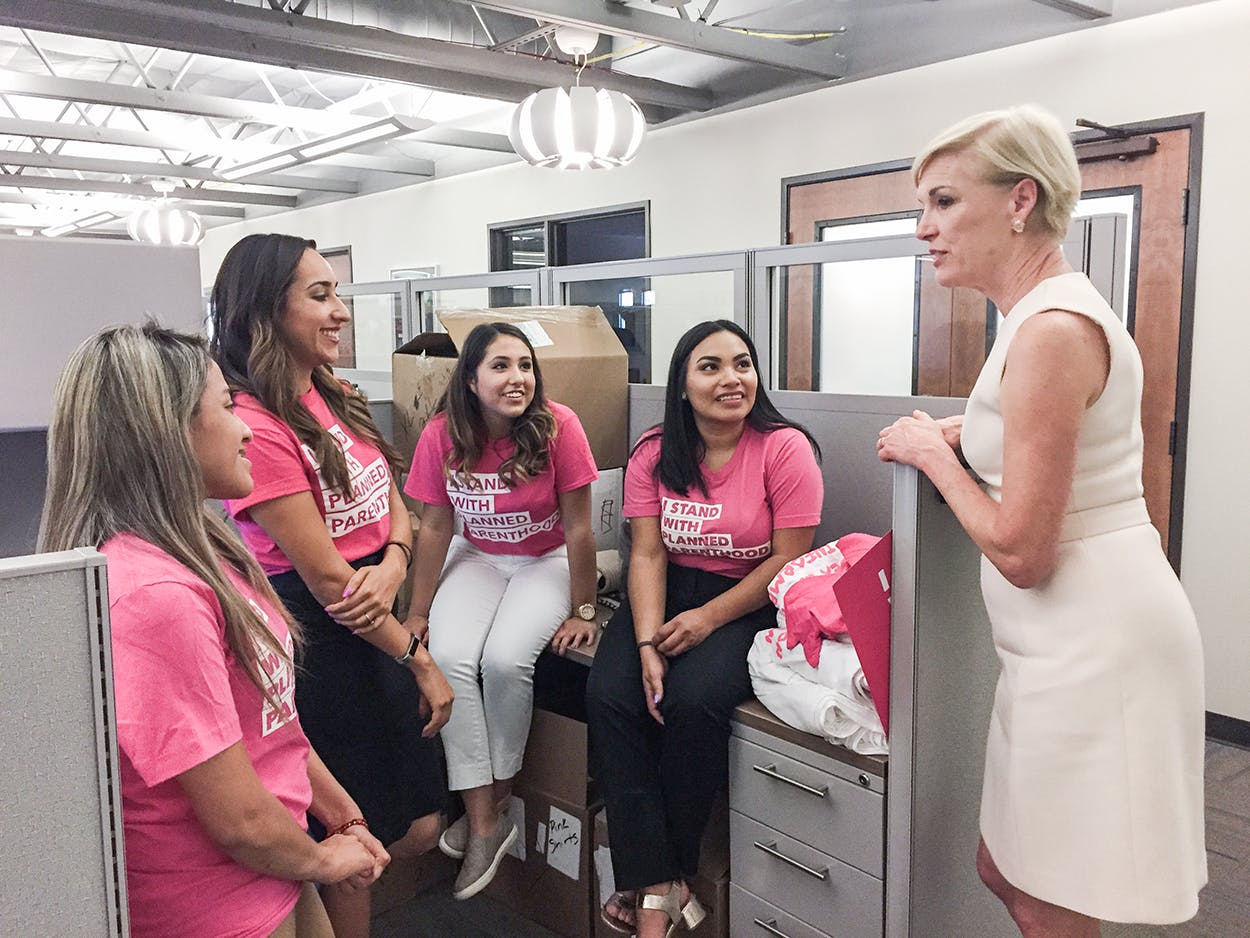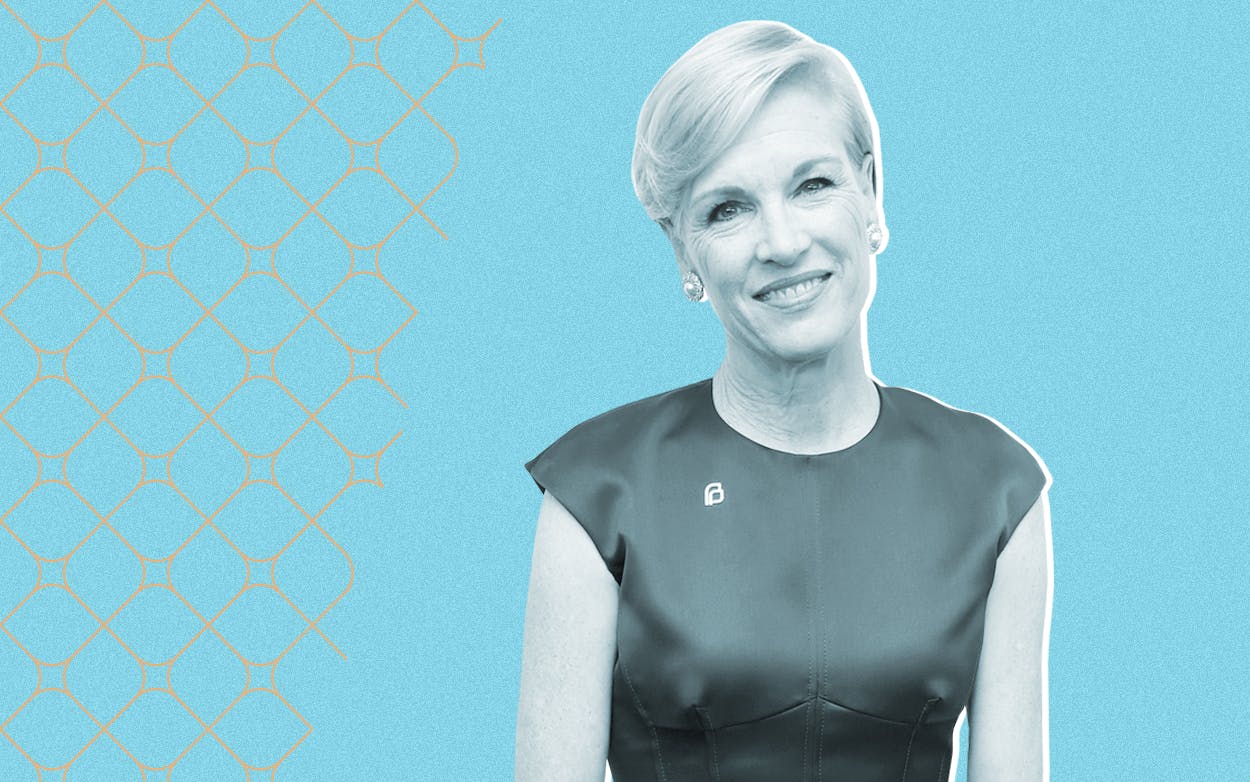Cecile Richards was an activist long before she began her tenure as president of Planned Parenthood. As a teenager in the seventies, she worked alongside her mother—eventual Texas governor Ann Richards—on early campaigns to elect women to the Texas Capitol, most notably Roe vs. Wade lawyer Sarah Weddington, who went on to serve three terms as a state representative. After college, Richards organized unions to help nursing home and garment workers in East Texas push for fair wages and better working conditions. And more recently, she led national campaigns to provide preventative care to millions of American women as the head of Planned Parenthood. Richards plans to leave the agency this spring, but says, “Whatever I do next, whether it be in Texas or around the country, it will be about making sure that women coming after me have more opportunity.” On April 3, Richards will release a memoir, Make Trouble, which she wrote in large part as a response to the women who approached her for guidance after the 2016 presidential election.
Texas Monthly: You grew up in a family of activists. What’s your first memory of taking a stand against authority?
Cecile Richards: It was in seventh grade, when I wore a black armband to school to protest the Vietnam War. We had just moved to Austin from Dallas. I remember feeling like I knew it was the right thing to do, but I was pretty sure I’d be the only kid wearing a black armband. Turns out, I was pretty much right. The principal called me into his office to ask if my parents knew what I was doing. I told him I was pretty sure they did, but he insisted on calling my mother. She wasn’t home, and that was probably the best break he ever got.
Being called into the principal’s office for that was a little terrifying, but it was also kind of thrilling—I was a good student, I never got into trouble. I was always trying to please my mother—and my father, once in a while. I thought the best way I could impress them was to be as much of a troublemaker as they were.
TM: You were involved in some of the first races to elect women to statewide office in Texas. What did you learn from those campaigns?
CR: Sarah Weddington’s campaign was not only about a woman candidate, but it was fueled by women and run by women. They had already been the phone bankers, and running the block-walking programs, and organizing the call lists, but it was very seldom that you saw a woman actually being in charge of a political race.
That made a lasting impact. When mom was elected, she was so committed to diversifying who was in state government. She appointed the first women and first African-Americans to lead different state agencies, and I see a lot of those folks now either in office or running programs. That’s exciting.
With women, once the door opens and you begin to bring other folks through, it makes a lasting difference. I saw that with Wendy Davis’s campaign, even though she wasn’t successful in her race. Young women all across America got involved in politics for the first time after the filibuster, and now they’re working on campaigns or for nonprofit organizations elsewhere.
Women are no longer going to be the first or the only. They’re going to be part of a whole sisterhood of women in office, and that’s going to make government better. I’d say that if we had more people in office who could get pregnant, we would quit fighting about things like Planned Parenthood and birth control.

TM: In Make Trouble, you write about how women often self-sabotage by not running for office unless they’re the most well-prepared candidate possible. How did you see that play out in the 2016 presidential election?
CR: Hillary’s race against Donald Trump certainly paralleled my mother’s race against Clayton Williams, where he openly made incredibly crude references to women and joked about rape. We saw that clear sexism repeated in the presidential race.
But Hillary’s defeat was also an enormous rallying moment. In some ways, it impacted women, regardless of the candidate they supported, to see another woman who would be so capable and so qualified beaten by someone who hasn’t really done anything that would make him qualified for public service.
It’s so deep-seated. Spending time in Washington, I always find that women in the Senate and the House are always the most prepared. But, in many cases, they have to be at least twice as good, twice as smart, and twice as accomplished to get ahead. That’s been the experience of so many women, and not just of my mother’s generation. Even today, they’re seldom the person being encouraged to run for office. Women look around and see that unless they really outperform, it’s hard to get any kind of equity.
TM: Many women have come forward publicly about their experiences with sexual harassment in the workplace. How do you think these stories can impact equity in that environment?
CR: For one, just knowing that other women have experienced what you’ve gone through is incredibly powerful. You look at the Me Too movement, and most women that I know are now really unpacking and reliving things that happened to them that may be really buried. There’s a power of having a sisterhood where you can actually talk openly, particularly about events where you’ve felt enormous stigma. I’ve seen that over this entire year, and it’s been true in the area of reproductive rights and abortion rights for all my life.
I saw that personally after I talked about my abortion in Elle. Women will come up to me and tell me thanks for telling the story, that it allowed them to then tell their parents or talk to their family or friends in a way they hadn’t done before.
TM: In the book, you also write about how you experienced sexual harassment while working at a law firm in college. How do you think the culture has changed to enable women to come forward?
CR: Back in those days, it was like there was no one to talk to, and there was such enormous shame around sexual assault, like, “What was wrong with you? Why didn’t you fight back?” In the employment situation, it was seldom that you could actually raise these issues, particularly if it was your boss. That’s why we have to not only call out how important it is for women to be treated well, but also give women and other people who have experienced sexual harassment an avenue to pursue justice. It’s going to take a lot to change the culture, and also to change the ability of women to actually exercise their rights.
TM: One of your first jobs was as a union organizer in East Texas, fighting to improve conditions for women working in nursing homes. Do you see the Me Too conversation impacting women working in service jobs?
CR: It’s so important that this isn’t a red carpet issue exclusively, but an issue for working women everywhere. For many years, I was an organizer of women in the service industry, who worked in hotels and nursing homes and as janitors. Sexual harassment and even sexual assault was not uncommon, but there was really no vehicle for women to speak up. That’s one of my biggest hopes, that this movement will not only be top-down, but it will be bottom-up.
Tarana Burke, who was one of the people who started the Me Too movement ten years ago, said to me the other night, “It’s not that women haven’t been speaking up and speaking out. We have for decades. It’s just that we’ve finally found a frequency where the rest of the world can hear us, and we’re not giving that up.” I love that thought, because I do think it reflects what women have felt for far too long. No one was listening to their stories, and now we found the frequency.
TM: So many of these national conversations seem to play out in Texas first. Do you see your home state as a testing ground for these issues?
CR: Texas has certainly been the cautionary tale of what happens when you shut down women’s health care programs for political purposes. Governor Perry’s efforts to get rid of Planned Parenthood in Texas not only didn’t work, but also caused dozens of women’s health centers to shut down, many of which were not even Planned Parenthood centers. It’s frightening to think that what the legislature in Texas has done to women’s health care, particularly access to birth control, is what the Trump administration is trying to do nationally. We’ve made such progress in reducing unintended pregnancy, and all of that is at risk now if the country goes the way of Texas.
But I’m also enormously hopeful. I’ve never seen anything like this explosion of organizing, of women forming their own groups, women running for office, women calling Congress, women marching. Despite the politics that we see in Washington and in Texas, that’s actually counter to where the American people are and certainly where American women are. Women right now are the most potent political force in this country, and if they vote this November, I think they will change the political fortunes and political direction.
This interview has been edited for clarity and length.
- More About:
- Politics & Policy
- Planned Parenthood
- Cecile Richards






